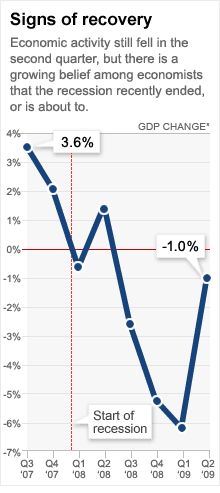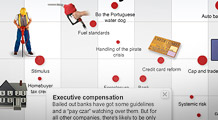Who should get credit for a recovery?
Most economists agree the economy has taken a turn for the better, but agreeing what got us here is the tough part -- and it's key to avoiding future mistakes.

NEW YORK (CNNMoney.com) -- Although the recession isn't officially over yet, there is a growing sense that the economy is now in a recovery. But there is also a growing debate about who deserves the credit.
The question of who should receive praise for helping to get the economy back on track may seem trivial. But knowing what policies worked, and which ones need to stay in place, could keep the recovery from stalling out.
Many in Washington have gone to extraordinary lengths to try and turn around the economy over the past year or so
Last year, Congress signed a blank check to Treasury to cover losses at mortgage finance giants Fannie Mae (FNM, Fortune 500) and Freddie Mac (FRE, Fortune 500) and created the $700 billion Troubled Asset Relief Program for banks. Earlier this year, lawmakers passed a $787 billion stimulus package.
Meanwhile the Federal Reserve slashed interest rates to nearly 0% and pumped more than $1 trillion into the economy with its bailout of AIG (AIG, Fortune 500), its support for mortgage-backed securities and various lending programs.
Federal Reserve chairman Ben Bernanke said in a speech last month that the Fed and Congress, as well as other governments and central banks around the world, deserve credit for stopping the global economy from falling into a depression.
"Without these speedy and forceful actions, last October's panic would likely have continued to intensify, more major financial firms would have failed, and the entire global financial system would have been at serious risk," he said.
A number of economists agree that the Fed, Congress and both the Bush and Obama administrations all deserve credit for steps taken to end of the recession.
"The actions of the Fed and Treasury starting last October actually worked, regardless of how unpopular they were," said Bill Hampel, chief economist of the Credit Union National Association. "It was messy. It was dirty. It required a lot of money. But they were successful in preventing the implosion of a lot of institutions."
Of course, it is easy to find fault with any particular program though.
"They tried an awful lot of things, some worked, some didn't," said Kurt Karl, chief U.S. economist for Swiss Re. "Mistakes were made. It was an ad hoc solution. It would have been surprising if they made no mistakes."
To be sure, some economists worry that all the efforts taken will lead to greater problems down the road. For example, the Fed may be risking a bout of inflation in the future if the money that has been pumped into the economy isn't withdrawn at just the right time.
There are also concerns about how the looming deficits from stimulus and other Congressional spending can only be repaid through higher taxes -- which will be a drag on the economy in the future.
"The economy needed a jolt and it got a jolt," said David Rosenberg, chief economist and strategist for asset manager Gluskin Sheff. "It gave us a sugar high, but there was no follow through. So it's going to come at the expense of future quarters."
But most economists still support the Fed's actions. The National Association of Business Economists (NABE) released a survey Monday that showed broad agreement about current monetary and fiscal policies.
And even though few economists believe that the stimulus package has been an unmitigated success, there is widespread agreement that government spending is providing a necessary boost to the economy right now.
"I don't think it's any accident that the recession ended when the stimulus was providing its greatest impact," said Mark Zandi, chief economist with Moody's Economy.com.
Still, it's reasonable to wonder if the current signs of recovery have more to do with how economic cycles work. In other words, the markets, and not the government, solved the crisis.
Worries about job losses and tight credit caused consumers to cut back spending, resulting in some pent-up demand. In addition, businesses slashed production, leaving inventories at very low levels.
"Now that everyone has figured out the bottom is not falling out, businesses will have to replenish the inventories," said Karl
As such, many experts think it will be important for the Fed and Congress to not go overboard in its attempts to stimulate the economy. The NABE survey found 76% of economists don't think another round of stimulus is needed at this point.
"It's very difficult to appropriately assess the true state of the economy, given how much medication it is on," said Rosenberg.
Others argue that the Congress and the Fed shouldn't stop trying to jump start the economy. Despite signs of progress, additional help will be required.
"I think the recovery is very fragile and we could lose it," said Zandi. "It's far from evolving into a self-sustaining economic expansion. Stimulus is temporary. It very likely will need more help from policymakers."
With that in mind, it's highly unlikely that any elected officials will rush to take credit for a turnaround just yet.
"As long as unemployment is near 10%, and we're still losing jobs, it doesn't feel like a recovery to anyone but economists," said Zandi. "They don't want to hang up a 'Mission Accomplished' banner."
Have you recently been laid off? Lost most of your retirement or college savings in the stock market? Dealt with the loss of the family breadwinner with no life insurance? If you've been confronted with some challenge during this recession and would like to have an expert review your situation, send an email to realstories@cnnmoney.com and you could be profiled in an upcoming segment on CNN. For the CNNMoney.com Comment Policy, click here. ![]()


